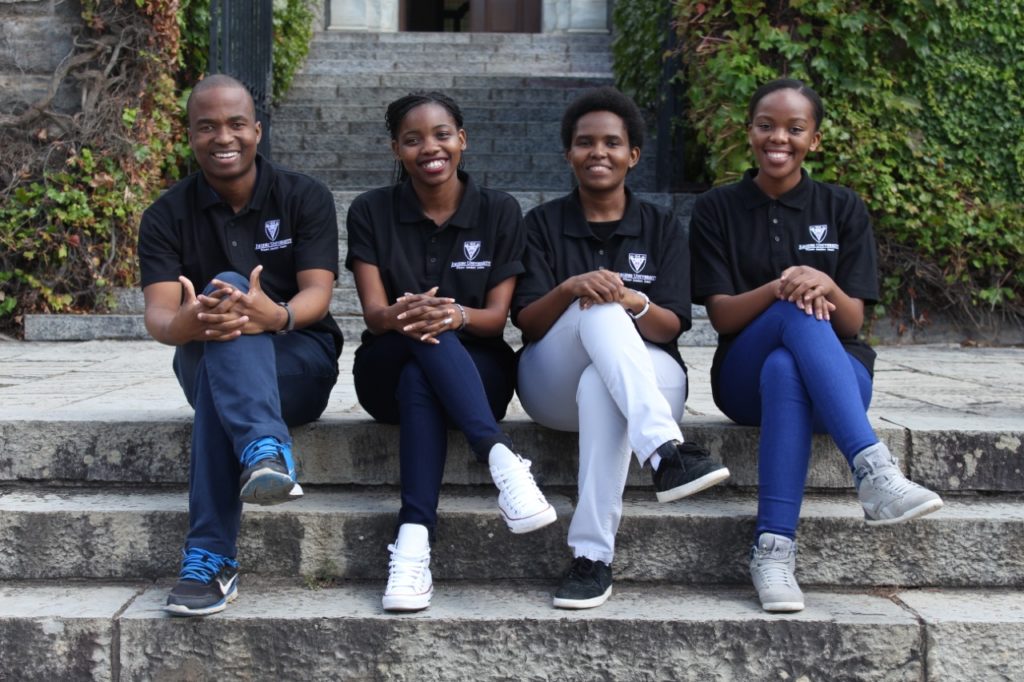Four Rhodes University PhD Chemistry students were awarded the top position in the 2019 Hult Prize Challenge for their electronic and electronic waste management system. Team E-Smart, Nobuhle Ndebele (24), Lindokuhle Nene (25), Reitumetse Nkhahle (26) and Gauta Matlou (29) participated in the 2019 Hult Prize Regional Summit held at the Brookhouse International School in Nairobi, Kenya, from 19 to 20 April 2019.
In its 10th year, the Hult Prize challenged innovative University and College students from across the world to a social-entrepreneurship start-up that will create more than 10 000 meaningful jobs in the next decade. The Team E-Smart business model, which aims to create job opportunities for the youth through collection of electronic and electrical waste materials and further recycling, repairing or repurposing into new market products so impressed the judges that they were awarded the top position against 45 other teams from across the world. Rhodes University was the only South African university repressing participating in the challenge.
Welcoming the participants in this year’s challenge, the 42nd President of the United States of America, Bill Clinton said: “Young people feel stuck. It is this feeling of being stuck that makes them vulnerable to resentment, and then to divisive political rhetoric and conspiracy theories like the ones we are witnessing today around the world. If you feel economically stuck and socially displaced and there is no lifeline and no options… I therefore believe that this challenge, to develop an idea that provides meaningful work for 10 000 young people within the next decade, is particularly important in the current global environment.”
Team coach and Senior Lecturer at Rhodes Business School, Dr Tshidi Mohapeloa said she decided to help the students to understand business language, as they are scientists. “I am impressed with how they adapted and understood the business world. This is an opportunity for them to become entrepreneurs,” Mohapeloa said.
Team E-Smart Leader, Gauta, said: “The reason we chose a business model based on electronic waste is because these electronics have hazardous components in them.”
Lindokuhle said they have decided to be the youth that is going to stand and create things for themselves. “We are the driving force and agents of change and improvement in our country. We want to lay a platform for generations to come after us, they must know that as a human being, you can do anything you put your mind to. Students must not limit themselves based on specific disciplines that they are doing,” said Lindokuhle.
must not limit themselves based on specific disciplines that they are doing,” said Lindokuhle.
According to the Team E-Smart, South Africa annually produces about 316 thousand tons of electronic waste. Only about 12% is collected and recycled and it is exported to other countries. The team want to contribute to the economy while also promoting proudly South African goods. “The electronic waste that is currently not collected and recycled or repurposed will raise about R15 Billion for the South African economy,” added Lindokuhle.
The team plans to visit schools across the country to raise awareness about electronic waste and its dangers while inspiring young people to open their minds to opportunities. Following this win, the team will spend eight weeks in the United Kingdom for the Hult-Prize Acceleration program starting on 27 July 2019. The programme aims to prepare the 25-plus winning teams from different regional summits for the final pitch competition, where the best business idea will win $1 000 000 as a start-up injection.


